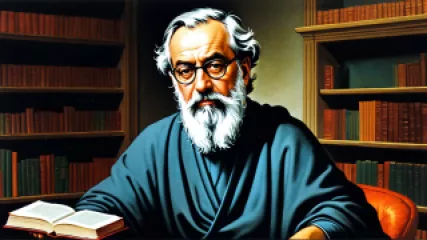Top 10 Thought-Provoking Books for Philosophical Guidance
Philosophy has long been considered the pursuit of knowledge and understanding, delving into the profound questions that shape our existence. It challenges us to explore the depths of our thoughts and beliefs, offering guidance in navigating the complexities of life. If you find yourself seeking philosophical guidance or contemplating existential questions, reading thought-provoking books can provide invaluable insights and perspectives.
1. "Meditations" by Marcus Aurelius
Meditations is a timeless classic written by Roman Emperor Marcus Aurelius. In this collection of personal writings, he reflects on Stoic philosophy and offers practical wisdom for living a virtuous life. Aurelius contemplates the nature of happiness, the transience of life, and the importance of self-discipline. His meditations serve as a profound guide to finding inner peace amidst the chaos of the world.
2. "Thus Spoke Zarathustra" by Friedrich Nietzsche
Thus Spoke Zarathustra is Nietzsche's most famous work, presenting his ideas on the concept of the "overman" and the death of God. Through poetic prose, Nietzsche explores themes of human potential, morality, and the eternal recurrence. This book challenges conventional beliefs and encourages individuals to embrace their individuality.
3. "The Republic" by Plato
In The Republic, Plato unfolds his vision of an ideal society governed by philosopher-kings. Through dialogues, he discusses justice, the nature of the soul, and the role of education in shaping individuals and communities. This influential work continues to inspire discussions on politics, ethics, and the pursuit of truth.
4. "Beyond Good and Evil" by Friedrich Nietzsche
Beyond Good and Evil is another profound work by Nietzsche that challenges traditional moral values. He critiques the binary notions of good and evil, advocating for a reevaluation of our moral frameworks. Nietzsche's thought-provoking ideas invite readers to question societal norms and forge their own path.
5. "The Stranger" by Albert Camus
The Stranger is a gripping existential novel that explores themes of alienation and the absurdity of life. Through the protagonist Meursault, Camus examines the human condition and the consequences of living without predefined meaning. This novel invites readers to contemplate the purpose and significance of their own existence.
6. "The Gay Science" by Friedrich Nietzsche
In The Gay Science, Nietzsche introduces the concept of the "eternal recurrence" and explores themes of nihilism, religion, and the pursuit of truth. This book encourages individuals to embrace life's uncertainties and find meaning in the face of existential challenges.
7. "Man's Search for Meaning" by Viktor E. Frankl
Man's Search for Meaning is a powerful memoir by psychiatrist Viktor Frankl, who recounts his experiences as a Holocaust survivor. Frankl explores the pursuit of meaning in life, emphasizing the importance of finding purpose even in the most challenging circumstances. This book offers profound insights into the human capacity to find hope and meaning in the midst of suffering.
8. "The Myth of Sisyphus" by Albert Camus
The Myth of Sisyphus delves into the philosophical concept of the absurd. Camus argues that life is inherently meaningless, yet individuals can find purpose through the act of rebellion against the absurdity of existence. This thought-provoking essay challenges readers to confront the fundamental questions of life's meaning.
9. "Existentialism Is a Humanism" by Jean-Paul Sartre
In Existentialism Is a Humanism, Sartre presents an overview of existentialist philosophy and its implications for human freedom and responsibility. He argues that existence precedes essence, emphasizing the importance of individual choice and the rejection of external determinism. This book provides a concise introduction to existentialist thought.
10. "The Power of Now" by Eckhart Tolle
The Power of Now explores the transformative power of living in the present moment. Tolle discusses the concept of ego, the illusion of time, and the path to inner peace and spiritual enlightenment. This book offers practical guidance for embracing mindfulness and finding liberation from psychological suffering.
While these books provide profound philosophical guidance, it is important to approach them with an open mind and engage in reflection. Each work offers unique perspectives that can inspire personal growth and self-discovery. Dive into the depths of these thought-provoking books and embark on a journey of philosophical exploration and introspection.






